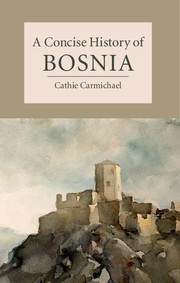Book contents
- Frontmatter
- Contents
- List of figures
- List of maps
- Acknowledgements
- Preface
- Chronology of events in Bosnian history
- 1 Introduction
- 2 Bosnia, Hercegovina and the Ottoman Empire (1463–1912)
- 3 Rebellion, war and the Habsburgs (1875–1918)
- 4 Royalist Yugoslavia, the Independent State of Croatia and the Second World War (1918–1945)
- 5 Bosnia and the Communist experiment
- 6 Bosnian independence, war and genocide
- 7 Conclusion: ‘unmixing’ Bosnia and Hercegovina
- Bibliography
- Index
6 - Bosnian independence, war and genocide
Published online by Cambridge University Press: 05 July 2015
- Frontmatter
- Contents
- List of figures
- List of maps
- Acknowledgements
- Preface
- Chronology of events in Bosnian history
- 1 Introduction
- 2 Bosnia, Hercegovina and the Ottoman Empire (1463–1912)
- 3 Rebellion, war and the Habsburgs (1875–1918)
- 4 Royalist Yugoslavia, the Independent State of Croatia and the Second World War (1918–1945)
- 5 Bosnia and the Communist experiment
- 6 Bosnian independence, war and genocide
- 7 Conclusion: ‘unmixing’ Bosnia and Hercegovina
- Bibliography
- Index
Summary
FROM POLITICAL CRISIS TO WAR
In the period of the dissolution of state between the spring of 1990 and 1992, some of the Yugoslavian republics found themselves in a more straightforward position to move towards independence than others. Although Croatia had been ‘silent’ for many years before the elections in 1990, some important issues with regard to the national question had been determined by the active diaspora community. In other words, most Croatian nationalists in 1991 were not overtly seeking a slice of Bosnia: the breakdown in Bosnian–Croatian relations occurred later in 1993. Slovenians had prepared for independence at all levels of society and this political transition had few important enemies by July 1991. Bosnia found itself singularly badly prepared for the end of Yugoslavia and, in particular, a Serb nationalist insurgency instigated from outside the republic. From early 1992 until the winter of 1995 Bosnia was mired in the worst military conflict in Europe since the Second World War. The immediate causes are to be found in the revival of a Četnik programme among a small stratum of Serb intellectuals that quickly reignited popular nationalism. Bosnian Serbs went from being good Yugoslavs to enemies of their neighbours within a matter of months. Many of these nationalists were from outside Bosnia and their aims were significantly abetted by Slobodan Milošević in Serbia. The more long-term causes of conflict were the malaise in the economy, residual notions of ‘self-defence’, the chasm between the city and countryside and the absence of strong, unifying political leadership when the League of Communists collapsed.
In many respects, the situation in Bosnia came to resemble the deteriorating circumstances in Croatia in 1991. The declared independence of the neighbouring republic had led to intense fighting in contested regions that bordered on Bosnia.
- Type
- Chapter
- Information
- A Concise History of Bosnia , pp. 135 - 170Publisher: Cambridge University PressPrint publication year: 2015



